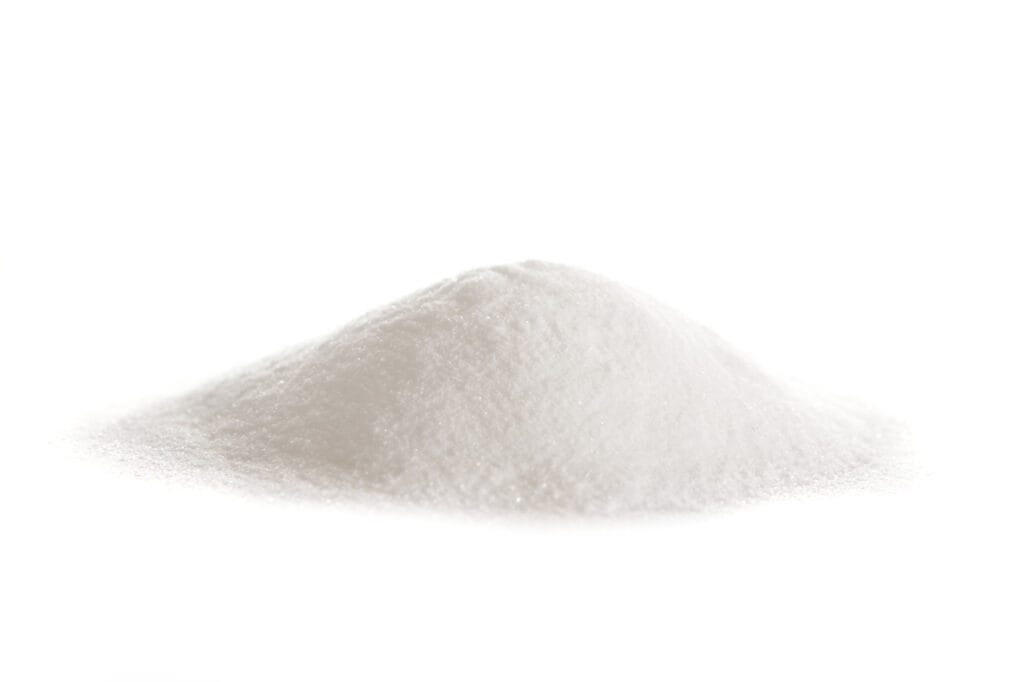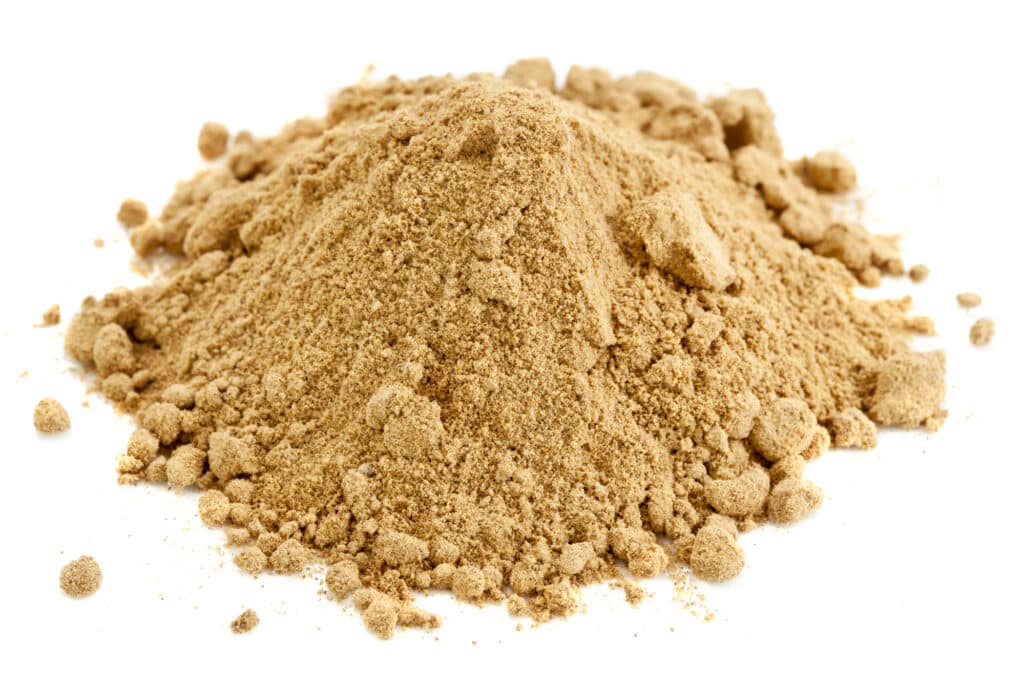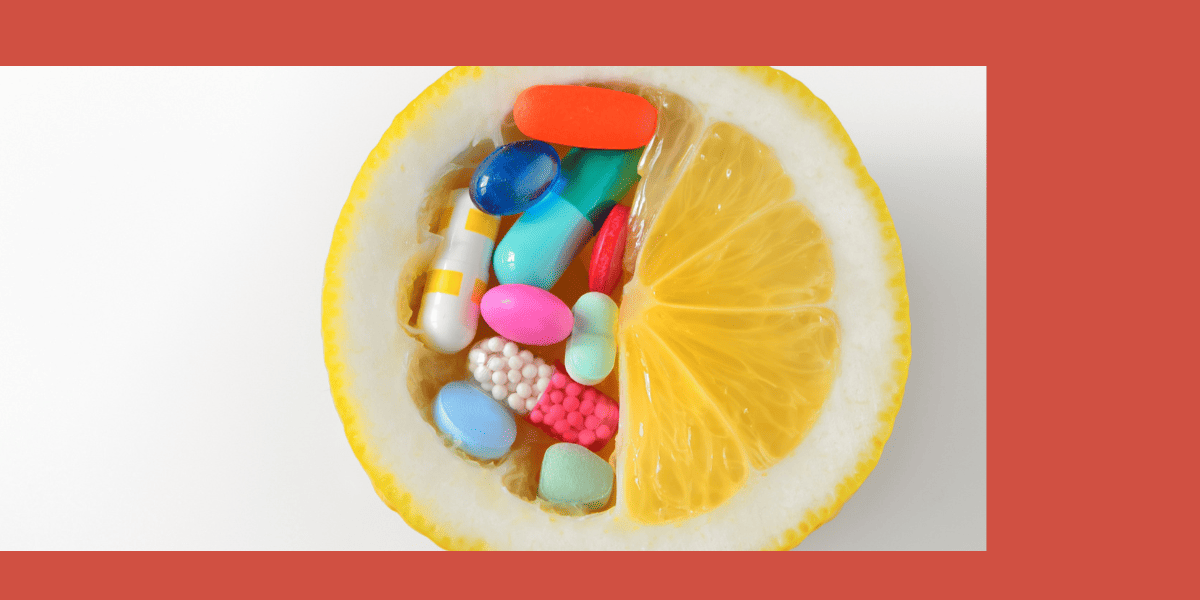EDITOR’S SUMMARY: You’re not feeling well—exhausted with a slight cough, and a bit of a sore throat. Better get that vitamin C, you tell yourself. You swing over to the local convenience store and scan the shelf. You see a few bottles and determine the price is fair enough, so you head over to the checkout. It didn’t occur to you to read the “other ingredients,” or question the quality of the supplement you’ll be ingesting. Then your alarm rings, and you wake up from the dream, feeling grateful that what you just experienced never happened.
Written by Carter Trent
Edited by Nicki Steinberger, Ph.D.
It’s common knowledge that the human body requires an array of vitamins and minerals to function normally. To ensure you’re getting these nutrients, you may have dipped into synthetic supplements—”isolated nutrients, usually made artificially in an industrial process,” first mass-produced on an industrial scale in the 1940s.
Of these, vitamin C, also referred to as ascorbic acid, is a popular choice. A ConsumerLab survey found vitamin C is among the top ten most popular vitamins and supplements. It’s also in the top ten among search results related to dietary supplements.
Consider this: Vitamin C supplements are commonly manufactured by distilling ascorbic acid from corn (non-organic corn = genetically modified organisms: GMOs). The original method used for decades to create the supplement was the Reichstein process. This process employed harmful chemicals, such as acetone, used in paint remover, to distill the ascorbic acid.
A two-step fermentation manufacturing process that reduces the need for these chemicals is now available, but unless you call the manufacturer of the supplement, you won’t know if the Reichstein process was used.
The vitamin’s popularity is due in part to its role in history. As many as two million sailors are estimated to have died from scurvy in the 19th and earlier centuries due to vitamin C deficiency.
In the 1970s, vitamin C was heralded as a key ingredient in staving off illness by scientist and two-time Nobel laureate, Linus Pauling. He detailed his conclusions in the book, “Vitamin C and the Common Cold,” which became a bestseller.
The notion of vitamin C as a salve against colds, flus, and viruses persists to this day, as seen by the massive jump in vitamin C sales when the COVID-19 pandemic hit in 2020. The Council for Responsible Nutrition’s annual consumer survey on dietary supplements found that vitamin C joined multivitamins and vitamin D as the top three supplements of 2020. That year, vitamin C sales ballooned over 60%.
It’s true vitamin C plays an important role in keeping the body healthy. Many people are aware vitamin C supports the immune system, ensuring it’s working properly to protect your body from disease by stimulating the activity of white blood cells.
In fact, studies have shown vitamin C can help to reduce the severity and duration of colds, particularly when at least 200 milligrams per day were consumed. It helps prevent infections, and enhances your body’s ability to absorb iron from food.
It’s also an antioxidant—a substance known to counteract cell damage in your body caused by free radicals, molecules you’re exposed to through sources such as air pollution, industrial seed oils, and cigarette smoke.
Vitamin C plays a role in your body’s ability to produce collagen, the most abundant protein in your body. Collagen is used in the production of connective tissue, a key component of muscles, bone, skin, tendons, and cartilage. Collagen is also essential in healing wounds.
Human anatomy does not produce vitamin C on its own, and because this vitamin is water-soluble, your body doesn’t store it. Many sources of vitamin C exist in food, which is a good thing, as you must get it from your diet. It’s found in cruciferous vegetables such as broccoli, cabbage, and cauliflower, and in fruit, including kiwi, oranges and grapefruit. It’s also abundant in tomatoes, Brussels sprouts, and berries.
Since vitamin C is readily available in food, does it make sense for you to take a nutritional supplement? Certainly, supplements can be more convenient; pop a pill and you’re done. Research comparing the human body’s ability to absorb vitamin C from synthetic supplements versus food revealed no difference. Both sources provided the body with this important vitamin.
However, the decision to take a vitamin C supplement isn’t necessarily straightforward. The first step to evaluating if you need a supplement involves comparing the amount of vitamin C you’re currently getting to how much your body needs.
Finding Your Dose
According to the U.S. Food and Drug Administration (FDA), the recommended daily value for vitamin C, which represents the amount of the nutrient to consume each day for a healthy adult, is 90 milligrams. This is the amount used by the FDA to calculate the percent of daily value shown on the nutrition label of food packaging.
The National Academies of Sciences, Engineering, and Medicine publishes more detailed vitamin C intake amounts based on age, gender, and health condition, such as if you smoke or are pregnant. It recommends 90 milligrams of vitamin C for men, and 75 milligrams for women who are 19 years of age or older.
The amount increases for women over 19 years old who are pregnant to 85 milligrams, and who breastfeed to 120 milligrams. Smokers require an additional 35 milligrams on top of the recommended amounts for their age and gender. That’s because smoking increases oxidative stress, a process that can trigger cell and tissue damage. As a result, vitamin C is depleted as your body combats this damage.
For children, the recommended amount of vitamin C varies as they grow:
- From birth to 6 months, 40 milligrams of vitamin C is recommended
- For infants from 7 months to a year, 50 milligrams
- For children aged 1 to 3, 15 milligrams
- For children aged 4 to 8, 25 milligrams
- For children aged 9 to 13, 45 milligrams
- For teenage boys, 14 to 18 years old, 75 milligrams
- For teenage girls, 14 to 18 years old, 65 milligrams
Once you know your recommended daily amount, you can contrast this to how much vitamin C you’re consuming. To do that, you can use the U.S. Department of Agriculture’s (USDA) FoodData Central website to look up nutrition information for various foods.
For example, 100 grams of raw red bell peppers, the equivalent of half a cup, delivers 142 milligrams of vitamin C. The same amount of broccoli provides 91.3 milligrams, while 100 grams of navel oranges includes 59.1 milligrams of vitamin C.
If you’re routinely eating fruits and vegetables, and are a healthy adult, you’re likely getting the necessary vitamin C to meet the recommended daily allowance. In this case, taking a supplement may not be necessary.
That’s because your body has a limit in terms of how much vitamin C is absorbable. According to the National Institutes of Health (NIH), about 70% to 90% of vitamin C is absorbed when consuming under 180 milligrams per day. When the amount of vitamin C reaches 1,000 milligrams per day, absorption drops to less than 50%, and the excess ascorbic acid is excreted through your urine.
In fact, taking vitamin C in mega-doses of thousands of milligrams through supplements can cause health issues such as nausea, abdominal cramps, headaches, heartburn, and diarrhea due to the unabsorbed ascorbic acid in the gastrointestinal tract. As a result, the National Academies of Sciences, Engineering, and Medicine set 2,000 milligrams as the maximum daily intake of vitamin C for healthy adults.
In addition, an 11-year study of ascorbic acid supplements published in the Journal of the American Medical Association (JAMA) showed that taking vitamin C supplements of 1,000 milligrams led to a twofold increase in kidney stones for men.
Interferences, Chemicals, and Fillers in Synthetics
Another advantage of eschewing a synthetic vitamin C supplement is that it can interfere with medications you’re taking. The FDA warns:
“Certain dietary supplements can change absorption, metabolism, or excretion of a medication. If that happens, it can affect the potency of your medication, which means you may get either too much or too little of the medication you need.”
For example, vitamin C increases your absorption of aluminum from medications containing this element. Even over-the-counter drugs can be affected, such as antacids, many of which contain aluminum in the form of aluminum hydroxide. If you have kidney disease, excess vitamin C intake from synthetic supplements may contribute to your body’s inability to flush out aluminum effectively, causing toxicity.
Drugs such as aspirin and acetaminophen can be impacted by high doses of vitamin C supplements because it causes more of these drugs to stay in the body, raising the amounts in your blood. Some studies suggest vitamin C supplements can interfere with cancer treatments, including chemotherapy drugs, while other research supports vitamin C’s efficacy in protecting normal tissue from the damage caused by chemotherapy. Consequently, cancer patients should consult with an oncologist before taking vitamin C supplements.
Exasperating this situation is that the makers of supplements don’t have to prove to the FDA that their products are safe or that they even work. The supplement manufacturers can include potentially harmful chemicals, or their products may be contaminated. As a result, the FDA warns against buying supplements from overseas sources, or at locations such as flea markets.
Some dietary supplements may contain added ingredients such as fillers, binders, and flavorings. Check the Supplement Facts label found on the vitamin C supplement you’re considering to see if it contains additional ingredients you may not want to ingest, such as sugars, dyes, and flow agents.
The 2020–2025 Dietary Guidelines for Americans, developed jointly by the USDA and the U.S. Department of Health & Human Services states:
“Because foods provide an array of nutrients and other components that have benefits for health, nutritional needs should be met primarily through foods.”
Higher Dosages at Play
Research has shown that whenever your health undergoes physiological stress, such as during illness, your body uses up more vitamin C than normal to help you recover. This requires you to consume more than the recommended daily requirements to replenish your vitamin C levels.
For example, giving birth vaginally consumes enormous amounts of vitamin C. In a study of hospital patients, Canadian researchers discovered nearly 80% of patients were below normal levels of vitamin C. Another study showed an 8% reduction in time spent in a hospital’s intensive care unit (ICU) when patients took a daily vitamin C dose of at least 500 milligrams.
When your body suffers physiological stress, the quantity of vitamin C needed to replenish the amounts used by your body varies based on the situation. The study looking at vitamin C’s ability to reduce ICU stays revealed daily vitamin C doses of 500 to 1,000 milligrams was the minimum required to make a difference.
Supplements are the best way to get these high vitamin C doses during times of physiological stress. Since every person’s health and medical condition is different, your body’s ability to tolerate larger vitamin C doses may be lower or higher than the recommended maximum daily intake of 2,000 milligrams.
The way to determine your vitamin C tolerance level is to ensure you’re getting at least the FDA-recommended daily levels and gradually increase from there until you reach bowel tolerance, which is when your stool becomes loose but not to the point of diarrhea. If you exceed bowel tolerance, your body is shedding excess vitamin C rather than absorbing it, so you should decrease your dosage. Also be sure to drink water while taking vitamin C supplements to protect your kidneys.
If taking a vitamin C supplement makes sense for you, take consideration for the type of vitamin C that’s best for you. Vitamin C in the form of ascorbic acid is what often causes the gastrointestinal problems described above, such as nausea. An alternative, sodium ascorbate is a type of mineral salt derived from ascorbic acid. Sodium ascorbate is less acidic, so it can help you avoid gastrointestinal issues. The downside to sodium ascorbate is that it contains sodium, so if you’re watching your salt intake, you can try calcium ascorbate instead. This is also a form of mineral salt from ascorbic acid, so it’s less acidic.
Once you’ve selected your vitamin C supplement, buy from trusted sources, and read those ingredient labels. Skip ahead to “other ingredients” to see what’s additionally included. You can also confirm the dosage to ensure it’s in line with your integrative healthcare practitioner’s recommendation.
Food-Based C Is a Good Idea
Getting your vitamin C from food provides many advantages over supplementation. Arguably of key importance—when you eat food, you consume other nutrients along with the vitamin C. This includes fiber, which is a factor in maintaining a healthy digestive system, regulating glucose (sugar) levels, and lowering triglycerides (fat in your blood).
Many fruits and vegetables contain phytochemicals, compounds that may reduce the risk of diabetes, hypertension, heart disease, and certain cancers. Foods containing phytochemicals include citrus, broccoli, and Brussels sprouts, the same foods that are good sources of vitamin C.
Furthermore, several epidemiological studies have shown that higher consumption of fruits and vegetables is associated with decreased likelihood of stroke, heart disease, and various cancers. All of these benefits make getting your vitamin C from food the ideal approach.
That said, munching on bushels of leafy greens and buckets of fruit isn’t your only food-based vitamin C option, just as synthetic vitamin C isn’t your only supplement option. Whole-food-based supplementation exists, and is a smart choice if you’re choosing to support your health—prevention and/or treatment for illness—outside of the foods you eat.

You see, ascorbic acid (synthetic vitamin C) carries health risks you may not be familiar with. While vitamin C has long been known as an antioxidant (supporting your cells through the tough times), it’s also been studied for its pro-oxidant impact.
In other words, synthetic vitamin C has been shown to induce oxidative stress—linked to the development of a host of diseases, including Parkinson’s disease, Alzheimer’s disease, and myocardial infarction, along with many more adverse health conditions.
Found in the New York Times, as far back as 1998, “Taking Too much Vitamin C Can Be Dangerous, Study Finds”:
“Vitamin C supplements [ascorbic acid] in large doses have been linked to genetic damage as far back as the mid-1970’s. In a study then, Canadian researchers found that use of the vitamin in doses larger than in the British study, but not much larger than the amounts some people take to ward off colds and the flu, damaged genetic material in three systems: bacterial cells, human cells grown in test tubes, and live mice.
The lead author of the new study, Dr. Ian Podmore, said that at 500 milligrams, vitamin C did act as an antioxidant on one part of the DNA, the guanine bases. Oxidation of guanine to oxoguanine is what is usually measured to determine the degree of DNA damage through oxidation. As expected, when the volunteers took a daily 500-milligram dose of vitamin C for six weeks, oxoguanine levels indeed declined, “which is why vitamin C is generally thought to be an antioxidant,” Dr. Podmore said.
But when they measured a second indicator of DNA oxidation, oxoadenine, the researchers found that it had risen rather than declined, “indicating genetic damage to this DNA base,” Dr. Podmore said. A colleague, Dr. Joseph Lunec, said that at the 500-milligram level, vitamin C’s “protective effect dominated, but there was also a damaging effect.” “There should be caution about taking too much vitamin C,” Dr. Lunec said. “The normal healthy individual would not need to take supplements of vitamin C.”
And from the summary in Science Daily, “Vitamin C Produces Gene-Damaging Compounds, Test-Tube Study In Science Reports”:
“Vitamin C, known to be a DNA-protecting “antioxidant,” is a switch hitter, also capable of inducing the production of DNA-damaging compounds, suggests a study in the 15 June issue of the international journal, Science. Mutations caused by these compounds have been found in a variety of tumors.”

Natural, food-based, non-ascorbic acid vitamin C is made from an array of ingredients, such as camu camu berry, acerola cherry, amla berry, lemon peel, pomegranate, blueberry, rose hips, orange peel, raspberry, and more.
[Editor’s Note] – A Voice for Choice Advocacy (AVFCA) does not typically shout out particular brands or companies. However, since 100% food-based vitamin C supplements are typically challenging to source, below you’ll find three well-vetted options. AVFCA has no affiliation with these brands, and as always, you are encouraged to talk to your holistic practitioner as a co-participant in your healthcare program.
- Catie’s Organics – Whole Plant Food Vitamin C Plus™
- Pure Synergy – Pure Radiance C® Powder
- Dr. Schulze’s – Super-C Plus Powder

To err on the side of caution, in accordance with the available research, attaining your vitamin C from food first, and then high-quality food-based supplements seems a good path to follow. Of course if you desire a stronger immune system, other pieces of the puzzle to incorporate into your daily lifestyle include consistent physical activity, stress-reduction practices, and deep, restorative sleep.
~
Published on June 08, 2023
If you’d like to contact A Voice For Choice Advocacy, please email media@avoiceforchoice.org.
If you would like to support the research and health education of AVFC editorial, consider making a donation today.

